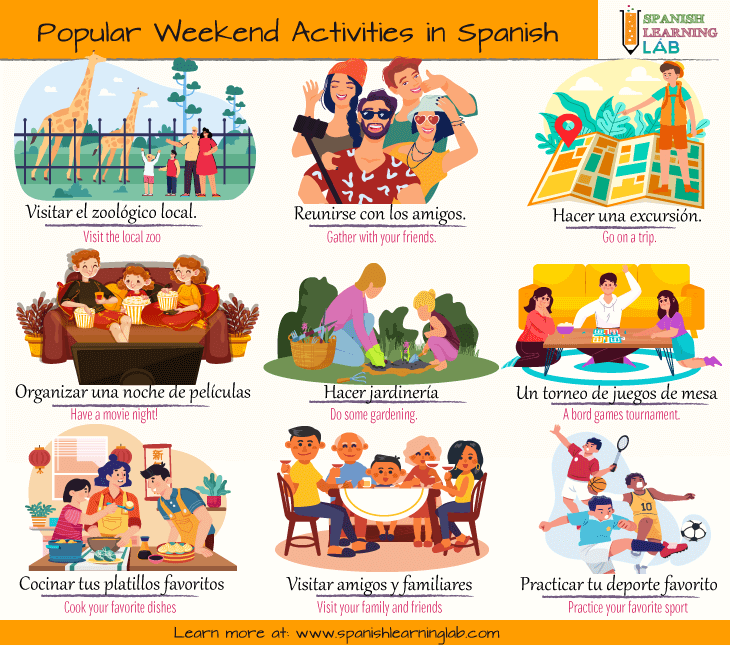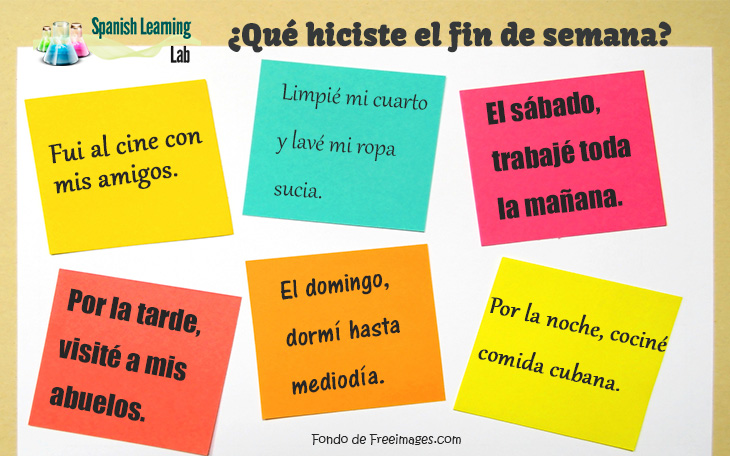Welcome to a new lesson. This time, we will cover some essential phrases and questions to talk about what you did last weekend in Spanish. You will have the chance to read and listen to many examples with the preterite tense, and more importantly, practice with two listening activities and quizzes. Let’s start…
The preterite tense in Spanish and past activities
First, the past tense will be used to talk about last weekend in Spanish – “el fin de semana pasado”. You should know that the past tense in Spanish has two forms, one called the preterite tense used for actions that happened and are totally over such as “Fui al cine” (I went to the movies), and one for repeated or simultaneous actions like “Miraba la televisión cuando sentí el terremoto…” (I was watching TV when…). In general, the preterite tense is the predominant grammatical tense to form sentences about the things we did last weekend in Spanish.
The following image shows some popular activities that people do on weekends, which we will later use in short conversations in this lesson.

Making sentences about past actions in Spanish
As we mentioned before, it’s very common to use the preterite tense of verbs to talk about things we did in the past, such as our activities last weekend. Remember that there are rules for conjugating verbs so they agree with the subject of the sentence, whether they are regular or irregular. Pay attention to the following examples using the activities in the image above.
|
HACER – ¿Qué hiciste tú el fin de semana pasado?
DO – What did you do last weekend? |
|
VISITAR – Mi familia y yo visitamos el zoológico local. Nos encantó ver los animales.
VISIT – My family and I visited the local zoo. We loved seeing the animals. |
|
REUNIRSE – Yo me reuní con mis amigos. Celebramos mi cumpleaños y tomamos muchas fotos.
GETTING TOGETHER – I got together with my friends. We celebrated my birthday and took lots of photos. |
|
IR A UNA EXCURSIÓN – Yo fui a una excursión. Monté mi bicicleta y recorrí el bosque.
GO ON A HIKING – I went on a hiking trip. I rode my bike and rode through the forest. |
|
ORGANIZAR ALGO – Ella organizó una noche de películas con sus amigas.
ORGANIZE SOMETHING – She organized a movie night with her friends./div> |
|
CUIDAR DE LAS PLANTAS – Los niños y yo cuidamos y abonamos las plantas del jardín.
TAKE CARE OF THE PLANTS – The children and I took care of and fertilized the plants in the garden. |
|
JUGAR AJEDREZ – Yo invité a mis primos a casa y jugamos en un torneo de ajedrez.
PLAY CHESS – I invited my cousins over and we played in a chess tournament. |
|
COCINAR – Él organizó una reunión con sus amigos y cocinó un asado de res delicioso.
COOKING – He organized a get-together with his friends and cooked some delicious roast beef. |
|
VISITAR – Ellos manejaron su auto por 8 horas para visitar a sus abuelos.
VISIT – They drove their car for 8 hours to visit their grandparents. |
|
PRACTICAR – Yo practiqué fútbol con mi equipo el sábado y practiqué piano el domingo.
PRACTICE – I practiced soccer with my team on Saturday and practiced piano on Sunday. |
Interactive quiz
Fill in the blanks with the preterite tense of the verbs in parentheses to complete the weekend activities on the test. You can use a conjugation tool to check that you are using each verb correctly.
Talking about last weekend in Spanish (sample conversations)
Below are two short sample conversations using several of the activities we saw in the examples above, and many more. In these types of conversations, it’s always a good idea to add sequence adverbs such as “primero” (first), “luego” (then) and “por último” (last) as they are very useful to tell stories or lay out a sequence of events in Spanish.
What I did last weekend in Spanish
It’s time to listen to the first example. Pay attention to how this person follows the rules for the past tense to create a nice paragraph about his weekend in Spanish. The verbs in infinitive in this example are: ser, hacer, estar, arreglar, limpiar, lavar, visitar, platicar, ir, bailar, pasar, dormir y leer.
Lo que hice el fin de semana pasado
El fin de semana pasado fue muy entretenido. El sábado por la mañana, estuve en mi casa e hice los quehaceres. Arreglé mi cama, limpié mi cuarto y lavé mi ropa sucia. El sábado por la tarde visité a mis abuelos. Platicamos un rato y luego fui a comprar ropa. Por la noche, mis amigos y yo fuimos a una discoteca. Bailamos toda la noche y la pasamos muy bien. El domingo dormí hasta mediodía. Por la tarde, leí un libro y por la noche fui al cine.
What did you do last weekend in Spanish?
The second example is a short dialogue about the things someone did last weekend in Spanish. The key question in this short conversation is “¿Qué hiciste el fin de semana (pasado)?” (what did you do last weekend?). You could also ask what he/she did on that specific day with: “¿Que hiciste el sábado?” (what did you do on Saturday?) and “¿Qué tal tu domingo?” (what about Sunday?). The verbs you will see in the dialogue are: estar, tener, hacer, mirar, organizar, invitar, reventar, bailar, jugar, comer, salir, limpiar, poder and pasar.
¿Qué hiciste el fin de semana pasado?
- Carlos: Hola Alberto ¿Cómo estás?
- Alberto: Bien, ¿y tú?
- Carlos: Un poco cansado. Tuve un fin de semana muy ocupado.
- Alberto: ¿Qué hiciste el fin de semana?
- Carlos: Pues mira, el sábado fue el cumpleaños de mi hija. Organizamos una pequeña fiesta de cumpleaños. Invitamos a varios de sus amiguitos. Los niños reventaron una piñata, bailaron, jugaron varios juegos divertidos y comieron pastel claro.
- Alberto: ¿Todo salió bien?
- Carlos: Sí, todo salió muy bien. Mi hija estaba feliz.
- Alberto: ¿Qué hiciste el domingo?
- Carlos: El domingo por la mañana limpiamos la casa. Por la tarde, fuimos a un parque de diversiones. Como puedes ver, tuve un fin de semana ocupado con mi familia. Eso sí, la pasamos muy bien… Dime ¿Qué tal tu fin de semana?
- Alberto: Bueno, mi fin de semana…
Listening Activity No. 1: How I spent my weekend in Spanish

Listening Activity No. 2: Talking about your weekend in Spanish
Key expressions in the conversation:
- “Se pasó volando“, means “It flew by”
- “No fue tan entretenido“, means “It was not that fun”
- “Tengo una idea… ¿qué te parece?”, means “I have an idea… what if we…”
You made it to the end of this lesson. We hope you now have a better idea on how to talk about your weekend in Spanish. Remember that “la práctica hace al maestro” (practice makes perfect). ¡Hasta la próxima lección!
Related Spanish Worksheets:
- Common Irregular Verbs in Spanish
- The Imperfect Tense in Spanish
- The Preterite Tense in Spanish
- Irregular Verbs in Spanish in the Preterite Tense
- Let’s talk about the past in Spanish – Conversation cards
